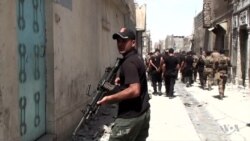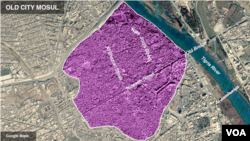Iraqi generals say Islamic State's destruction of the iconic al-Nuri mosque in Mosul is a sign that the militant group's power in the city is coming to an end.
Soldiers in Mosul tell VOA that IS wanted to destroy the mosque in advance of an Iraqi and Coalition victory over the group in Mosul. Iraqi forces have been working to eradicate the terror group from one of its last strongholds in the city.
“As you see, our fighters overcame strong resistance here, and you can see how hard they fought. It is difficult traveling this small city. The roads and the geography are difficult,” Lt. Gen. Abdul Ghani al-Assadi of Iraq's special forces said in Mosul.
The medieval mosque, also known as Mosul's Great Mosque, had stood for more than 800 years and is where Islamic State leader Abu Bakr al-Baghdadi in 2014 declared himself caliph over parts of Iraq and Syria.
An Iraq military official said its forces were within 50 meters of the mosque Wednesday night when IS militants "committed another historical crime by blowing up" the building and its leaning minaret, known as al-Hadba, or "the hunchback.”
Islamic State's Amaq news agency issued its own statement with a counter narrative, accusing U.S. aircraft of destroying the mosque.
U.S. and coalition officials quickly rejected the terror group’s assertions.
“As our Iraqi Security Force partners closed in on the al-Nuri mosque, ISIS destroyed one of Mosul and Iraq's great treasures," Operation Inherent Resolve’s Maj. Gen. Joseph Martin said in a statement, using an acronym for the terror group.
“Blowing up the al-Hadba minaret and the al-Nuri mosque amounts to an official acknowledgement of defeat,'' Iraqi Prime Minister Haider al-Abadi proclaimed on his Twitter account late Wednesday.
But fleeing civilians say inside neighborhoods still held by IS, families are starving and mortars, bombs, and IS sniper fire are still killing people as they run.
Pentagon correspondent Carla Babb, National Security correspondent Jeff Seldin and reporter Jamie Dettmer contributed to this story







